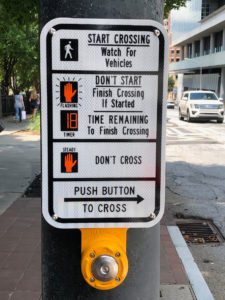How do you keep on learning a language during the lockdown? How do you improve your English when you can’t go to classes, conversation tables, private lessons? More generally, how do you get your language skills up by yourself?
Though some of this information might be useful for a beginner, the point here is to give some practical suggestions to those who have already reached an intermediate proficiency, with a focus on English. Nothing revolutionary, just a reminder of a few well-known strategies and ideas.
A Diagnostic
First, ask yourself three diagnostic questions. Your answer to these questions should influence the way you go about working on your English.
- What are my goals? Which skills do you want or need to develop? Do you want to focus on developing your conversation skills, your reading competence? Are you preparing for a language test, a job interview?
Then, a couple of times a year, check whether you have reached your goals. If you haven’t, ask yourself why not. Were your goals too high? Unrealistic given your level or your circumstances? Are you going about reaching them the wrong way? What do you need to change: your goals or your strategies? - How do I learn? You should have an idea by now about how you learn. What usually works for you? What doesn’t? Do you have a good memory? Do you learn well by yourself or do you need prodding from others? Are you a grammar person or do you just dive into the material and learn the rules as you go?
- How much time do I have? Be realistic. Think mid or long-term, not just the next couple of weeks. Unless, of course, you have a short-term deadline to meet.
Take a few minutes now, and write down your answer to these questions.
So, what can you do by yourself to improve your English?
Listening
There is no way around it. If you want to have good conversational skills in a language, you have to listen to it. A language is made of sounds, intonation, musicality, words and sentences spoken sometimes quite fast. Unless your goal is only to read and write, you have to increase your listening skills. If you want to play blues, you have to listen to blues music. If you want to speak a language decently, you have to listen to it.
Here is a little listening practice.
Fortunately, getting better at listening to English is not too hard to do by yourself. For more about this, have a look at my post about listening to English.
Reading

Most people who learn a language want to be able to read it. They don’t necessarily want to read novels or newspapers but they want to at least be able to understand forms, instructions, advertisements, signs in the city, official documents, etc. without having to always look at a dictionary or Google translate it. In my experience, this is the easiest skill to develop since it involves only passive reception and texts can be read several times.
- If you live in a country where the language you are learning is used, read everything around you: advertisements in your mailbox or in public spaces, signs in the street, packaging, etc.
- Always try to read a little bit above your level. You want to bring your level up after all.
- Read in a field that interests you, your hobby or something that you know you will use.
- Be realistic. Make it a goal to read one article or a couple of pages a week. Read them a couple of times and learn the essential vocabulary you need to understand the main ideas. Don’t be afraid to read the same text several times. You will be amazed how much you understand at the second or third reading. It is sometimes better to reread a text than to keep on reading new texts you don’t understand. After a while, you would get discouraged and quit.
Speaking
This is probably what most people are more interested in why they start learning a language. They want to speak it. Unfortunately, for various reasons, it is also one of the most difficult skills to develop by oneself.
Speaking, like writing, requires more effort because you have to create content rather than simply understand what someone else is producing. It takes more creativity, it’s tiring, it’s frustratingly slow sometimes. But with time, most people can reach a pretty good speaking level if the circumstances and the way they go about it are right.
Speaking takes practice, and practice, and practice. There is no way around it. The problem for many people is finding speaking opportunities.
- If you have a family member or a friend who speaks English, see whether it would be possible to speak with that person. Unfortunately, that’s not always easy.
- Another trick, try to speak to yourself in English or to think in English. For example, every day try to tell yourself a few short sentences in English: I need to turn the oven on, I have to go buy some bread, I wish I had done this earlier, etc. This is a good way to review vocabulary and practice structures you have been learning.
- Read texts you have read in class aloud or repeat things you listen to: songs, short texts, etc. A good practice is to repeat a sentence or two, several times is even better.
- Another method is to reproduce something you are listening too. Start with a sentence or two that you reproduce in your own words. As you get better, try to reproduce or sum up, longer speeches. You can try to use some of the new vocabulary or expressions you just heard.
- You don’t have to take a language class to improve your speaking skills. If your level is good enough (I would say B1), why not register for a class in something that interests you once the lockdown is over? A cooking, computer or yoga class given in English? They are easy to find in international cities (see Meetup for example). Don’t be afraid if English is not your mother language, you probably won’t be the only one in the group.
- Another possibility is to find someone you can connect with online. Be aware though that very often this will not be free.
- Also, work on your pronunciation. You don’t want to just speak, you want people to actually understand you. One tool that helps tremendously for English is knowing the Phonetic Alphabet. Learn it (it’s easy) and use it.
A last comment about speaking. In many cases, what prevents people from progressing in speaking is not intelligence or the right circumstances. Very often the main obstacle to speaking a foreign language is fear, social pressure: You are afraid to look like a fool and that people will make fun of you. In my experience, unless there is a hidden problem (racism, prejudice or the like), most people will not make fun of you when you stumble through their language. On the contrary, they will very often appreciate your trying and will help you if necessary and asked.
Writing
I think that writing is the hardest skill to master. Fortunately, unless you need to take a writing test, it is, I think less crucial than the other skills.

Think about it. Unless you are in a situation that requires a lot of writing, how often do you write in your own language? And even if you do write regularly, there are plenty of online resources and programs to help you translate, correct and improve what you write. For French and English, I use Antidote.
How about trying to start copying sentences? Then, start writing your own sentences, even just a few short ones a week. Then correct them with a program or, better, have someone help you improve them. It may not be much, but it will be enough to progressively make a long-term difference.
Vocabulary
To speak a language you have to learn new words. If you move to another country and start eating out, you have to learn the eating out vocabulary (the names of food items, the stages of a meal, etc.). If you want to buy shoes or food at the local market, you have to get the needed vocabulary down.
You know that, of course. But how do you do that?
They key again is what your goals are and how to get there. Since I will write about learning vocabulary in another post, I won’t say more about this here.
Grammar
At this stage, since this post assumes you have a certain level of English, your concern is not learning grammar but checking issues and questions here and there.
There are plenty of web sites that can help you with grammar (see the stack exchange or the BBC Learning English site for example). I still think it’s nice to have a printed grammar or two. I usually recommend Practical English Usage. It is written for people who learn English but already have an intermediate level (I would say B1).
- Focus on what you have problems with. If you still stumble on some points, it might be good to do some exercises you have already done again.
- If necessary, spend a week really getting down one problematic issue if you can. It’s when you have used something new several times that you really master it and make it your own. After a while, it will be like your mother tongue, you won’t even think about it.
- If you really are stuck. Just ask a friend or former teacher for help or check online.
Conclusion
In conclusion, improving your English skills is much like improving your skills in anything else. You need to have realistic goals and, from time to time, check whether you are actually reaching them. And you need to practice regularly.
This was written for my intermediate and upper intermediate ESL students at the EPFC but I hope it helps you too.
(PS. The Westminster picture is not mine but I forgot where I got it.)
